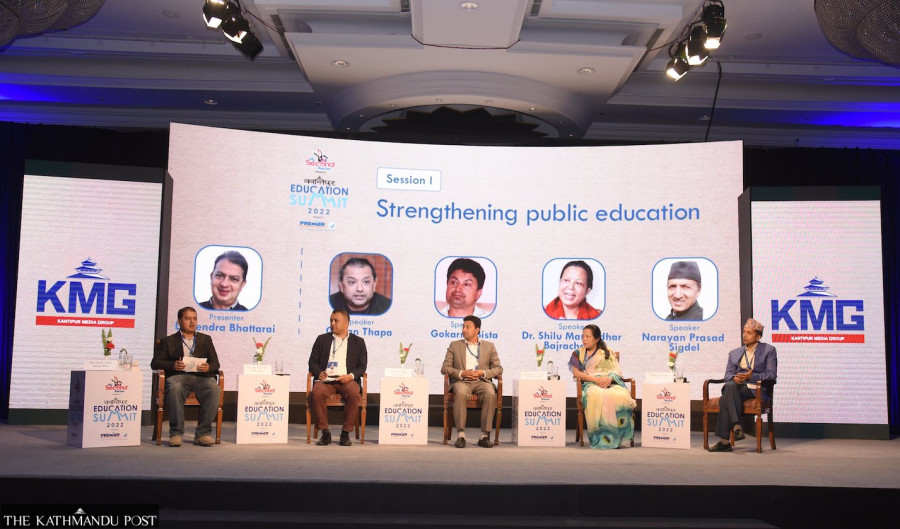National
Government’s action necessary to strengthen public education, say experts
Six years since the promulgation of the Constitution, successive governments haven’t even prepared a bill for a Federal Education Act, which is crucial for improving school education.
Post Report
Improvement of public education always finds a place in the priority list of the ministers taking charge of the Ministry of Education, Science and Technology.
Every new minister says they will focus on reforming public education, the quality of which is questionably poor and getting poorer. Incumbent Education Minister Devendra Poudel had made the same pledge when he took charge of the ministry six months back. He reiterated the commitment in the first Education Summit organised in Kathmandu by Kantipur Media Group on Monday. “We are committed to improving the education sector, most importantly public education,” he said.
The day-long summit broadly revolved around four issues: strengthening public education, pros and cons of private education, international education and future of education. Most of the speakers said that despite repeated claims by people in power little had been done to improve the education sector of the country, especially public education.
Speaking on the occasion, Nepali Congress General Secretary Gagan Thapa said a Federal Education Act is a prerequisite for improving the education sector. However, over the six years since the promulgation of the Constitution of Nepal, successive governments haven’t even prepared a bill for the Act. “The constitution has given the responsibility of education to all three tiers of governments. However, their authority hasn’t been segregated in the lack of a federal law,” he said. “Strengthening public education is not possible without having the law in place.”
Poudel is the fifth education minister since the promulgation of the Constitution and the third since the last general elections. However, no government has taken any concrete initiatives to promulgate the Act. Poudel agreed there has already been a delay in having the law in place.
Concurring with Thapa, he agreed that reforms in the education sector and strengthening public education are not possible without the law.
Educationists and politicians speaking on the occasion said along with the law and proper education policy, competent teachers and headteachers, adequate financing, infrastructure, timely revision of the curriculums and coordination between teachers and guardians are necessary to improve the education sector.
“Public education lacks quality and only the upper section of society has access to private education. This is creating a disparity,” said Bidya Nath Koirala, a professor at the Tribhuvan University. “Private schools are more oriented to profit than service whereas it should be the other way round.”
He said the private sector is so powerful that it can even influence policy decisions which is also the reason why the quality of education in public schools is degrading.
Education experts say since a majority of students in Nepal attends public schools, the education sector can never improve without strengthening such schools. “There are complaints about the quality of education at public schools. It is the responsibility of the government to improve it,” said Suresh Raj Sharma, a former vice-chancellor at Kathmandu University. “At least one model school can be opened at every local unit.”
Around 80 percent of students are studying in 29,000 public schools in Nepal while private schools serve the rest–20 percent. “While it is necessary to improve public schools, we cannot underestimate the role of private schools,” said Umesh Shrestha, minister of state for the Prime Minister’s Office. “There can be a collaboration between the private and public schools to strengthen the public education system.”
Those who have championed improving the quality of education in public schools say the overall quality of education can only be improved when it is tied to skills. “Why can’t our children engage in agriculture while they study? This gives them skills and confidence,” said Narayan Sigdel, principal of Janajyoti Secondary School in Surkhet, one of the best public schools in the country. “This is the best way to improve the quality of education. It works and we have proved that.”




 9.89°C Kathmandu
9.89°C Kathmandu













